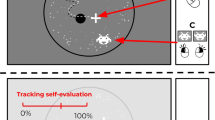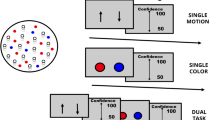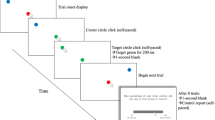Abstract
The cues contributing to people’s metacognitions of agency were investigated in two experiments in which people played a computer game that involved trying to “touch”, via a mouse moving a cursor, downward scrolling X’s (Experiment 1), or trying to “explode” the downward scrolling X’s (Experiment 2). Both experiments varied (a) proximal action-related information by either introducing or not introducing Turbulence into the mouse controls and (b) distal outcome-related information such that touched X’s “exploded” either 100 or 75 % of the time. Both variables affected people’s judgments of agency (JOAs), but the effect was different. First, the decrement in feelings of agency was greater with the proximal variable than with distal variable. Second, while the proximal variable always had a large direct effect on JOAs, even taking judgments of performance (JOPs) into account, JOPs completely accounted for the effect of the distal variable in Experiment 1, where the instructions were just to touch the X’s. And even in Experiment 2, in which the instructions were to explode the X’s, the direct effect of the distal variable on JOAs was small. These data indicate that these two cues exhibit different psychological profiles. The proximal action-related information is a diagnostic cue to agency indicating the match between one’s own intentions and actions. Internal monitoring of intentions is necessary and so the self is implicated. However, distal outcome can be largely monitored using information external to the agent, and so—while it is used by people to make agency judgments—it is a non-diagnostic cue.





Similar content being viewed by others
References
Alloy LB, Abramson LY (1979) Judgment of contingency in depressed and nondepressed students: sadder but wiser? J Exp Psychol Gen 108:441–485
Anscombe GEM (2000) Intention. Harvard University Press, Cambridge
Balslev D, Nielsen FA, Lund TE, Law I, Paulson OB (2006) Similar brain networks for detecting visuo-motor and visuo-proprioceptive synchrony. Neuroimage 31:308–312. doi:10.1016/j.neuroimage.2005.11.037
Bandura A (1989) Human agency in social cognitive theory. Am Psychol 44:1175–1184
Bandura A (1996) Self-efficacy: the exercise of control. Freeman, New York
Bandura A (2001) Social cognitive theory: an agentic perspective. Annu Rev Psychol 52:1–26. doi:10.1146/annurev.psych.52.1.1
Blakemore S-J, Decety J (2001) From the perception of action to the understanding of intention. Nat Rev Neurosci 2:561–567. doi:10.1038/35086023
Blakemore S-J, Frith CD, Wolpert DM (1999) Spatiotemporal prediction modulates the perception of self-produced stimuli. J Cogn Neurosci 11:551–559
Blakemore S-J, Wolpert DM, Frith CD (2000) Why can’t you tickle yourself? NeuroReport 11:R11–R16. doi:10.1097/00001756-200008030-00002
Chambon V, Wenke D, Fleming SM, Prinz W, Haggard P (2012) An online neural substrate for sense of agency. Cereb Cortex. doi:10.1093/cercor/bhs059
Chaminade T, Decety J (2002) Leader or follower? Involvement of the inferior parietal lobule in agency. NeuroReport 13:1975–1978
Danto AC (1965) Basic actions. Am Philos Q 2:141–148
David N, Newen A, Vogeley K (2008) The “sense of agency” and its underlying cognitive and neural mechanisms. Conscious Cogn 17:523–534
Davidson D (2001) Essays on actions and events. Clarendon Press, Oxford
Decety J, Lamm C (2007) The role of the right temporoparietal junction in social interaction: how low-level computational processes contribute to meta-cognition. Neuroscientist 13:580–593
Deci EL, Ryan RM (2000) The “what” and “why” of goal pursuits: human needs and the self-determination of behavior. Psychol Inquiry 11:227–268
Farrer C, Frith CD (2002) Experiencing oneself vs another person as being the cause of an action: the neural correlates of the experience of agency. Neuroimage 15:596–603. doi:10.1006/Nimg.2001.1009
Farrer C, Franck N, Georgieff N, Frith CD, Decety J, Jeannerod M (2003) Modulating the experience of agency: a positron emission tomography study. Neuroimage 18:324–333
Farrer C, Frey SH, Van Horn JD, Tunik E, Turk D, Inati S, Grafton ST et al (2008) The angular gyrus computes action awareness representations. Cereb Cortex 18:254–261. doi:10.1093/cercor/bhm050
Fourneret P, Jeannerod M (1998) Limited conscious monitoring of motor performance in normal subjects. Neuropsychologia 36:1133–1140
Gallagher S (2007) The natural philosophy of agency. Philosophy Compass 2:1–11
Gentsch A, Schutz-Bosbach S (2011) I did it: unconscious expectation of sensory consequences modulates the experience of self-agency and its functional signature. J Cogn Neurosci 23:3817–3828
Haggard P (2008) Human volition: towards a neuroscience of will. Nat Rev Neuro 9:934–946. doi:10.1038/nrn2497
Haggard P, Tsakiris M (2009) The experience of agency: feelings, judgments, and responsibility. Current Directions Psychol Sci 18:242–246
Haggard P, Clark S, Kalogeras J (2002) Voluntary action and conscious awareness. Nat Neurosci 5:382–385. doi:10.1038/nn827
Jenkins HH, Ward WC (1965) Judgement of contingency between responses and outcomes. Psychol Monog 79: Whole No. 79
Joseph MA (2004) Donald Davidson. McGill-Queen’s University Press, Montreal
Knoblich G, Stottmeister F, Kircher T (2004) Self-monitoring in patients with schizophrenia. Psychol Med 34:1561–1569
Lau HC, Rogers RD, Passingham RE (2007) Manipulating the experienced onset of intention after action execution. J Cogn Neurosci 19:81–90. doi:10.1162/jocn.2007.19.1.81
Leube DT, Knoblich G, Erb M, Grodd W, Bartels M, Kircher TT (2003) The neural correlates of perceiving one’s own movements. Neuroimage 20:2084–2090
Lorch RF, Myers JL (1990) Regression analyses of repeated measures data in cognitive research: a comparison of three different methods. J Exp Psychol Learn 16:149–157
Metcalfe J (in press) Cues to agency. In: Terrace HS, Metcalfe J (eds) Agency and joint attention. Oxford University Press, Oxford
Metcalfe J, Greene MJ (2007) Metacognition of agency. J Exp Psychol Gen 136:184–199. doi:10.1037/0096-3445.136.2.184
Metcalfe J, Eich TS, Castel AD (2010) Metacognition of agency across the lifespan. Cognition 116:267–282. doi:10.1016/j.cognition.2010.05.009
Metcalfe J, Van Snellenberg JX, DeRosse P, Balsam P, Malhotra AK (2012) Judgements of agency in schizophrenia: an impairment in autonoetic metacognition. Phil Trans R Soc B 367:1391–1400. doi:10.1098/rstb.2012.0006
Miall RC, Wolpert DM (1996) Forward models for physiological motor control. Neural Networks 9:1265–1279
Miele DB, Wager TD, Mitchell JP, Metcalfe J (2011) Dissociating neural correlates of action monitoring and metacognition of agency. J Cogn Neurosci 23:3620–3636. doi:10.1162/jocn_a_00052
Pacherie E (in press) Sense of agency: many facets, multiple sources. In: Terrace HS, Metcalfe J (eds) Agency and joint attention. Oxford University Press, Oxford
Sato A (2009) Both motor prediction and conceptual congruency between preview and action-effect contribute to explicit judgment of agency. Cognition 110:74–83. doi:10.1016/J.Cognition.2008.10.011
Seligman MEP (1975) Helplessness: on depression, development, and death. Freeman, San Francisco
Spengler S, von Cramon DY, Brass M (2009) Was it me or was it you? How the sense of agency originates from ideomotor learning revealed by fMRI. Neuroimage 46:290–298. doi:10.1016/J.Neuroimage.2009.01.047
Strawson G (2003) Mental ballistics or the involuntariness of spontaneity. Proc Aristot Soc 103:227–256
Synofzik M, Vosgerau G, Newen A (2008) Beyond the comparator model: a multifactorial two-step account of agency. Conscious Cogn 17:219–239. doi:10.1016/j.concog.2007.03.010
Synofzik M, Thier P, Leube DT, Schlotterbeck P, Lindner A (2010) Misattributions of agency in schizophrenia are based on imprecise predictions about the sensory consequences of one’s actions. Brain 133:262–271. doi:10.1093/Brain/Awp291
Tricomi EM, Delgado MR, Fiez JA (2004) Modulation of caudate activity by action contingency. Neuron 41:281–292
Van der Wel R, Knoblich G (in press) Cues to agency: time will tell. In: Terrace HS, Metcalfe J (eds) Agency and joint attention. Oxford University Press, Oxford
Wegner DM (2002) The illusion of conscious will. MIT Press, Cambridge
Wegner DM, Wheatley T (1999) Apparent mental causation. Sources of the experience of will. Am Psychol 54:480–492
Wegner DM, Sparrow B, Winerman L (2004) Vicarious agency: experiencing control over the movements of others. J Pers Soc Psychol 86:838–848. doi:10.1037/0022-3514.86.6.838
Wenke D, Fleming SM, Haggard P (2010) Subliminal priming of actions influences sense of control over effects of action. Cognition 115:26–38. doi:10.1016/j.cognition.2009.10.016
Wolpert DM (1997) Computational approaches to motor control. Trends Cogn Sci 1:209–216. doi:10.1016/S1364-6613(97)01070-X
Wolpert DM, Ghahramani Z, Jordan MI (1995) An internal model for sensorimotor integration. Science 269:1880–1882. doi:10.1126/science.7569931
Acknowledgments
We would like to thank Patrick Kennedy, Karen Kelly, Greg Jensen, Rachel Burris, and the members of Metalab, for lively discussions and for help in conducting and programming these experiments.
Author information
Authors and Affiliations
Corresponding author
Rights and permissions
About this article
Cite this article
Metcalfe, J., Eich, T.S. & Miele, D.B. Metacognition of agency: proximal action and distal outcome. Exp Brain Res 229, 485–496 (2013). https://doi.org/10.1007/s00221-012-3371-6
Received:
Accepted:
Published:
Issue Date:
DOI: https://doi.org/10.1007/s00221-012-3371-6




